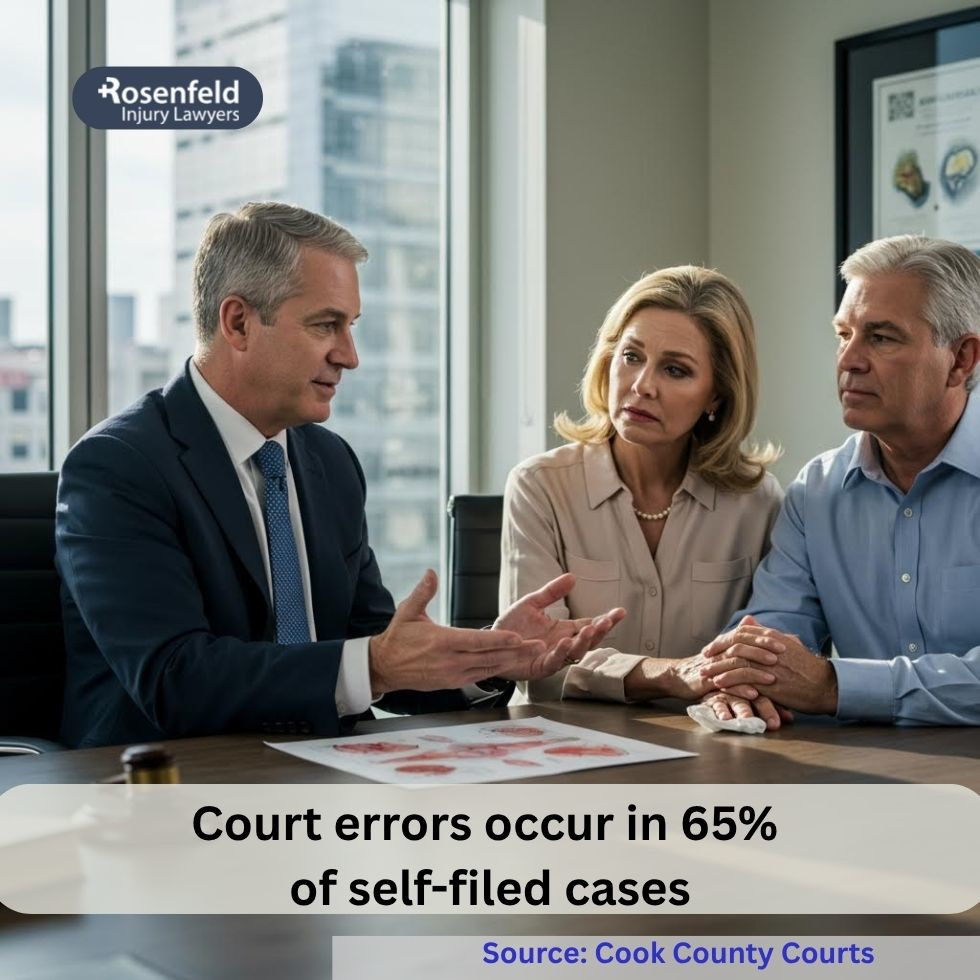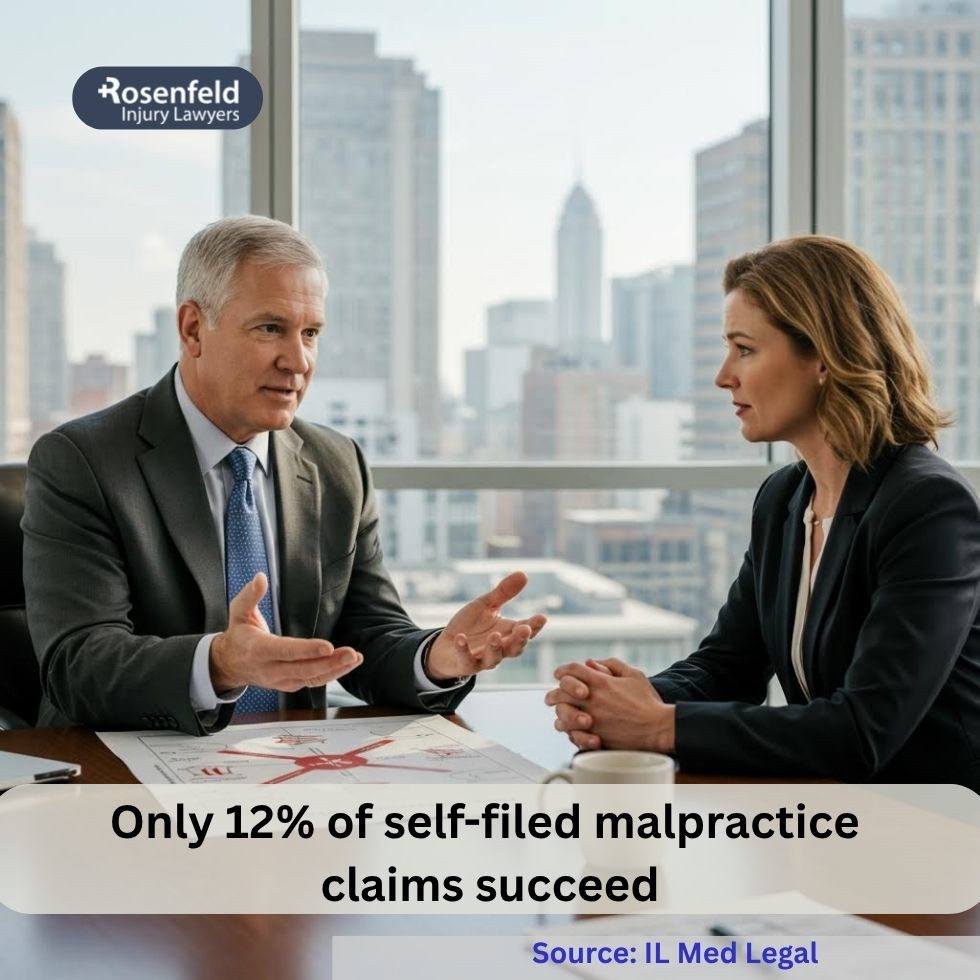- 24/7 Free Consultation: (888) 424-5757 Tap Here To Call Us
How to File a Medical Malpractice Lawsuit Without a Lawyer in Illinois
Knowing how to file a medical malpractice claim without a lawyer comes with a series of challenges. While filing a medical malpractice suit without an attorney in Illinois is possible, it involves a detailed process and a strong understanding of legal and medical issues.
Injured patients who choose to pursue a claim on their own must meet strict procedural requirements, from gathering medical records to presenting expert evidence. While self-representation can save on legal fees, it also carries significant risks.

What is Medical Malpractice?
Medical malpractice occurs when a healthcare professional fails to meet the accepted standard of care, resulting in harm to the patient. To prove a medical malpractice case, you must establish four elements:
Duty of care – The medical provider owed you a professional obligation.
Breach of duty – The provider failed to meet the standard of care.
Causation – That failure directly caused your injury.
Damages – You suffered measurable harm, such as medical bills or long-term health issues.
Illinois-Specific Laws and Requirements
If you’re considering taking legal action without a qualified attorney in Illinois, it’s critical to follow state-specific requirements to avoid dismissal of your claim. Two of the most important involve knowing when you must file your claim and what documents are required to initiate the lawsuit.
Statute of Limitations
According to the Illinois medical malpractice statute of limitations, you generally have two years from the date you knew or reasonably should have known of the injury caused by medical negligence to take legal action.
However, no lawsuit can be filed more than four years after the date the negligent act occurred, regardless of when the injury was discovered. For minors, the time limit extends to eight years, but the claim must be filed before the child turns 22. If you fail to file your lawsuit within the appropriate time frame, the court will likely dismiss your case, even if your claim is valid (735 ILCS 5/13-202).
Affidavit of Merit
Illinois law requires an affidavit of merit to be filed with any medical malpractice complaint. The plaintiff (you) must sign this affidavit and include a written report from a licensed medical practitioner who is qualified in the same medical field as the defendant. The expert must confirm that there is a “reasonable and meritorious cause” for the lawsuit.
Without this affidavit and supporting report, your complaint will likely be dismissed. This requirement is meant to prevent frivolous lawsuits and ensure that your claim has been reviewed by a knowledgeable medical professional (735 ILCS 5/13-202).

Preliminary Steps Before Filing
Before filing a medical malpractice lawsuit in Illinois, especially without an attorney, it’s essential to complete a few legally required steps to build the foundation of your case. These steps help clarify whether you have a valid claim and gather the evidence necessary to move forward in court. Thorough preparation can increase the chances of your case being taken seriously by the court and the opposing side.
Gather Medical Records
To support your claim, you’ll need to compile medical records from every healthcare professional involved. These records include hospital stays, doctor’s visits, lab results, diagnostic imaging, and any notes regarding your treatment. You can request them directly from each provider by submitting a written request along with any required authorization forms.
Under federal law, you have the right to access your medical records, though a small fee may apply. Reviewing your records can help identify where the alleged negligence may have occurred and whether any red flags exist in your treatment timeline.
Consult with a Medical Expert
Illinois law requires that you obtain a written affidavit of merit, supported by a medical professional’s opinion, to file a malpractice lawsuit. This means you must consult a licensed healthcare provider who practices in the same or similar specialty as the defendant.
The expert must review your case and confirm that the care provided likely fell below the accepted medical standard and caused harm. Without this expert opinion, your case cannot proceed. This step is critical for demonstrating that your claim isn’t speculative but based on professional medical assessment.
Consider Pre-Suit Mediation
While not mandatory in all medical malpractice cases, pre-suit mediation can be a valuable option in Illinois. Mediation is a voluntary process where both sides meet with a neutral third party to try to resolve the dispute before going to court. It may save time, reduce stress, and avoid the cost of a full trial.
Some courts or insurance companies may even encourage early mediation once a claim is filed. If you’re representing yourself, participating in mediation may provide insight into the strength of your case and open the door to a settlement without lengthy litigation.
Filing the Lawsuit
Once you’ve gathered evidence and consulted a medical expert, the next step in pursuing a medical malpractice lawsuit without a lawyer in Illinois is officially filing your case. This phase involves preparing key documents, submitting them to the appropriate court, and ensuring the defendant receives legal notice.
These steps must follow strict rules and deadlines, so accuracy is critical. Failing to file properly or serve the defendant correctly can delay your case or result in dismissal. Below are the essential components of this process:
Drafting the Complaint
The complaint is the foundational legal document that begins your lawsuit. It outlines your identity, the defendant’s identity, and a clear statement of facts explaining how the medical malpractice occurred. It must detail the alleged medical negligence, the harm caused, and how the healthcare provider breached the standard of care.
You’ll also need to include the specific legal claims and a “prayer for relief” stating what you are asking the court to award, such as compensation for medical expenses, lost wages, or pain and suffering.
Filing with the Court
Once the complaint is complete, it must be filed in the appropriate Illinois circuit court. This is typically the court in the county where the malpractice occurred or where the defendant healthcare provider operates.
Filing fees vary by county but generally range from $200 to $400. You can file in person at the courthouse or, in many counties, through the Illinois e-filing system. Keep copies of all submitted documents, including a file-stamped version of your complaint.
Serving the Defendant
After filing the complaint, you are legally required to serve a copy of the complaint and a summons on the defendant. This is called service of process and informs the healthcare provider that a lawsuit has been filed.
In Illinois, this can be done by a sheriff, a licensed process server, or by certified mail in some cases. Proper service is vital—if the defendant is not correctly served, your case may be delayed or dismissed. Once service is completed, you must file proof of service with the court.

The Litigation Process
Discovery
The discovery phase is a critical part of any medical malpractice case. During this period, both parties exchange information relevant to the case.
Discovery tools include interrogatories—written questions that must be answered under oath; depositions—oral testimony given under oath and recorded by a court reporter; and requests for production of documents, such as medical records, billing statements, or internal hospital communications.
This phase helps both sides build their case by uncovering facts, identifying key witnesses, and clarifying the nature of the medical negligence. Strong evidence uncovered during discovery often influences whether a case proceeds to trial or settles.
Motions and Court Hearings
Before trial, either party may file motions with the court. These are formal requests asking the judge to make rulings on specific legal issues. Common motions include motions to dismiss the case, motions to compel discovery, or motions for summary judgment (asking the court to decide the case without a trial).
Court hearings may be held to address these motions or to clarify procedural matters. While some motions can significantly narrow the case or even end it early, others help resolve disputes about evidence or testimony before the trial begins.
Trial
If the case isn’t settled during pre-trial negotiations, it will proceed to trial. At trial, both the plaintiff and the defendant present their evidence, question witnesses, and make legal arguments before a judge or jury. Medical experts often testify to explain whether the care provided met accepted medical standards.
The plaintiff must prove the provider’s negligence caused actual harm. After closing arguments, the jury deliberates and delivers a verdict. If the jury finds in favor of the plaintiff, they may award compensation for medical bills, lost wages, and other damages related to the malpractice.

Challenges of Representing Yourself
Filing a medical malpractice lawsuit without an attorney might seem like a cost-saving option, but it comes with serious risks. Illinois personal injury law is complex, and the legal process can be challenging to manage alone, especially for those dealing with an injury or health issues. From procedural requirements to courtroom strategy, self-represented plaintiffs face a steep learning curve that can affect the outcome of their case.
Legal Expertise and Procedures
Filing a medical malpractice claim without a lawyer can be overwhelming due to the complex rules of civil procedure and evidence. Illinois law requires strict adherence to deadlines, formatting rules, and legal standards, including the affidavit of merit. One mistake—like missing a filing date or miswording your complaint—can lead to dismissal of your case.
Self-represented plaintiffs must manage court filings, motions, discovery obligations, and more, all while recovering from injuries or managing ongoing care. Without legal training, understanding how to effectively build and argue a medical malpractice claim becomes a serious challenge with high stakes.
Negotiation and Trial Advocacy
Successfully pursuing a medical malpractice case means going up against experienced defense attorneys and insurance companies that are trained to protect their clients’ interests. These legal teams know how to discredit evidence, minimize liability, and pressure unrepresented plaintiffs into low settlements or case dismissal.
In court, you’ll need to present medical evidence, question expert witnesses, and respond to legal objections—all under formal procedures. Without experience in trial advocacy or negotiation tactics, you may struggle to secure a fair settlement or win your case, even if your claim has merit.
When to Seek Help From an Experienced Medical Malpractice Lawyer
While it’s possible to file a lawsuit without an attorney, there are situations where legal help becomes essential. If your case involves severe injuries, wrongful death, or complex medical issues, a Chicago medical malpractice lawyer can offer critical support. Legal representation is also essential if you’re unsure how to prove liability or if the insurance company or defense attorneys are pushing back aggressively.
An experienced medical malpractice attorney understands the legal system, can gather expert testimony, and negotiate a fair settlement, giving your claim the best chance for success.
Resources for Pro Se Litigants in Illinois
Self-represented litigants can find helpful tools on the Illinois Courts Self-Help Center. This site offers court forms, instructions, and guidance on filing a lawsuit. Additional support may be available through organizations such as Legal Aid Chicago, Prairie State Legal Services, and Land of Lincoln Legal Aid. These groups may offer free or low-cost help for qualifying individuals involved in a medical malpractice case or other civil matters.
Expert Legal Counsel for Your Medical Malpractice Claim

If you’ve suffered harm due to a healthcare provider’s negligence, Rosenfeld Injury Lawyers is here to help. While it’s possible to file a claim without an attorney, having an experienced attorney can protect your rights and strengthen your case.
Our Chicago personal injury lawyers work on a contingency fee basis, meaning you owe us nothing unless we recover compensation.
Call us at (888) 424–5757 or fill out our contact form for a free consultation. Our team can review your situation and explain your options for seeking compensation under Illinois medical malpractice law.
All content undergoes thorough legal review by experienced attorneys, including Jonathan Rosenfeld. With 25 years of experience in personal injury law and over 100 years of combined legal expertise within our team, we ensure that every article is legally accurate, compliant, and reflects current legal standards.







